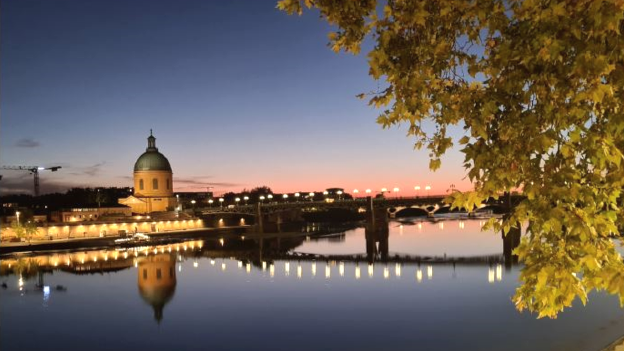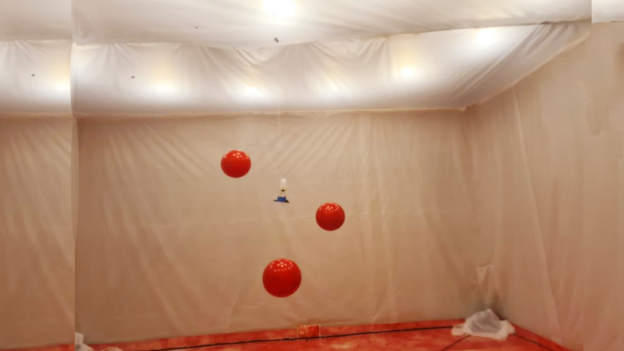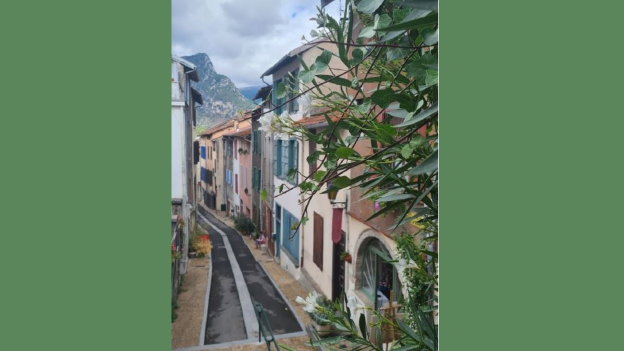Annkathrin Sonntag
 Privat
Privat
Toulouse at sunset
"In summary, my research stay funded by the Prof. Bingel Scholarship by the DAAD-Stiftung enabled me to learn a lot personally, including how to independently deal with challenges, but also professionally, in particular in terms of video tracking on a larger scale, and the intercultural exchange helped me to develop."
How do bumblebees learn to use the height of a food source? In recent decades, the topic of navigation has mainly been studied in the two-dimensional plane. Thanks to affordable technical tracking devices, the question of how animals navigate in their environment can now also be pursued in a third dimension. This is particularly important for flying animals such as bumblebees.
Here, Annkathrin Sonntag illustrates the results of her research in France and also looks at moments outside the University of Toulouse:
My PhD thesis deals with the navigation behaviour of bumblebees in a three-dimensional expanse. Previous research activities have mostly involved navigation within a two-dimensional expanse, so we don’t yet know much about how bumblebees exploit their flight altitude. Visual input in particular alters dramatically with a change in flight altitude, and the use of drones could also be interesting in terms of the use and the combining of visual input at different altitudes. The Prof. Bingel Scholarship enabled me to investigate how bumblebees learn about the altitude of their food sources and which information they use to do that. I was able to conduct four series of experiments within a short time span, in each case lasting several weeks, and to initiate their evaluation.
These experiments could be conducted on a larger scale than previously, since I was able to use larger spaces in Toulouse as a flight arena than are available in Bielefeld. It also gave me the opportunity to learn a lot about the computerised tracking of small objects, such as bumblebees, in a large three-dimensional expanse. The results of these investigations allow us to better understand the flight behaviour of bumblebees in their targeted search for a food source.
I was for instance able to discover that bumblebees don’t use optimal methods to search for a (during the tests non-existent) food source, which is in contrast to studies on search behaviour in a two-dimensional expanse (landmarks and ground-level food source). One explanation could be that flowers are always visually very dominant, so bumblebees don’t need to search for an unseen food source. Albeit during their search they clearly used three-dimensional landmarks that hung around this food source. Over the course of the experiments, I adapted them in such a way that I offered several empty feeding opportunities and gave the bumblebees places to land. This enabled me to discover that bumblebees can learn the altitude of an artificial food source given specific options.

Privat
Experimental setup with bumblebees at the sugar water dispenser (blue)
I was able to work in my mentor’s open-plan office during my stay, which made it easier to establish contact with the other doctoral candidates and postdocs. Unfortunately there was still a lot of working from home during my stay, so this contact was somewhat restricted. But despite that there was always someone I could speak with and who could assist me with questions or issues. This meant I could quickly get to know some other doctoral candidates, students, researchers and engineers – even beyond our working group – and could even experience the notable nightlife in Toulouse during a few collective visits to bars. The occasional group lunches and ‘cake Mondays’, where the doctoral candidates took it in turn to bring in a cake, also helped a lot with establishing contact.
I was allowed the use of a laboratory that I could organise in line with my experiments. I was somewhat surprised at the materials I took for granted from Germany, whereas in Toulouse they simply weren’t laboratory materials. But I was ultimately able to assemble all the required materials or use some creativity to come up with alternative solutions.
I did though benefit from a constantly available 3D printer and become acquainted with an entirely new flexibility in the design of experimental setups. Three bachelor’s students whose study projects I supervised also provided me with superb support. The close collaboration and managing our small project group made me very happy and I learned a lot about independent mentoring of students. Whilst conducting my experiments, I repeatedly encountered challenges I didn’t expect, such as procuring materials, communication with the institute’s administrative or workshop staff exclusively in French, unwelcome visitors to the experiments (ants are unfortunately a major problem in the building) or even the scheduling and agreement regarding land use. But in the main I’m happy to have learned a lot about dealing with such challenges and to confidently overcome them in the end. The exchange also enabled me to enhance my French language skills, above all my understanding of words that merge into one another.

Privat
A mountain village in front of the Pyrenees
I was fortunate to undertake a few excursions into the surrounding area with visitors from Germany, such as a hike through the Pyrenees and visits to some smaller medieval cities like Albi or Carcassonne. This enabled me to learn more about the surrounding region. In Toulouse itself, I really enjoyed the architecture of the city centre and the cycle paths along the Garonne or the canals. My journey home from university along the Canal du Midi was often refreshingly relaxing after a long day at work. I also especially remember the Christmas market, which was a great deal tawdrier and in part stereotypically German. There were even pretzels, spätzle and mulled wine on sale.
I shared my accommodation with an Italian woman and an Iranian man and found this intercultural exchange and our different perception of French culture that was new to us all to be very enriching. The new perspectives and stimuli from academic exchange in my guest working group greatly enriched my work and I’m looking forward to maintaining contact with my mentor from Toulouse.
As of February 2024. The German version is the original.


